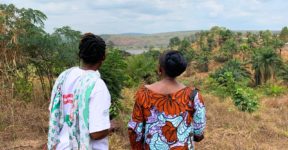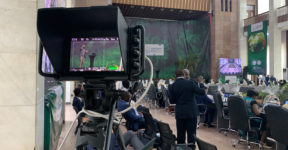
Going 'glocal': Innovating policies and partnerships
The impacts of international partnerships in the countries with the largest areas of tropical forests is explored in a report by think-tanks in Brazil, the Democratic Republic of the Congo, Indonesia and the United Kingdom.
Based on an equitable approach to research partnerships, the report offers recommendations for the ‘glocalization’ of international mechanisms that affect land-use and forest governance in the tropics.
In the report, 'glocalization' refers to balancing global and local priorities in international collaborations, particularly in the context of relationships between institutions in the Global North and Global South.
Here, we summarize the research findings of the report co-produced by the Centre for Transdisciplinary and Sustainability Sciences in Indonesia, Cebrap Sustentabilidade in Brazil, the Centre d’Etudes pour l’Action Sociale in the DRC and Chatham House in the UK.
International partnerships should address not only direct but also underlying drivers of deforestation and forest degradation such as large-scale commodity markets and land acquisitions.
Market-based instruments and hybrid initiatives for sustainable supply chains have been expanding as solutions in land-use and forest governance since the 1990s. It is believed that these mechanisms could be enhanced through the implementation of stronger environmental laws and regulations as well as the adoption of a 'glocal' approach to policymaking.
Traditional power asymmetries between Global North and Global South countries are often mirrored in transnational research partnerships and international policies. Institutions in the Global North frequently have disproportionate power in decision-making, project and research design, whereas implementation, field work and data collection is often delegated to Global South partners.
These unequal practices can lead to the extraction of knowledge from partners. Policymakers and policy researchers would benefit from recognizing the opportunities, as well as the challenges, in tackling equality, diversity and inclusion in international partnerships.
A newly thought research partnership was established between four policy institutes in Indonesia, Brazil, the DRC and the UK to advance such an equitable research partnership while examining prominent transnational initiatives that are affecting forest lands and peoples in the tropics.
‘Glocalizing’ the design of land-use and forest governance solutions entails redressing imbalances in the interplay between local and global imperatives in international collaborations and between institutions in the Global South and in the Global North. In this way, the implementation of equitable North-South partnerships contributes to ‘glocalize’ and improve environmental governance.
The results of this work highlight the importance of: (i) the quality of research partnerships, (ii) the role of institutes in the Global South in critical analysis of international policy and (iii) the need to revisit policy mixes and redress power asymmetries to achieve domestic and global priorities for sustainable development.
Based on the lessons learned in this project, an Equality, Diversity and Inclusion (EDI) toolkit was published as a brief which should be continuously improved, to contribute solutions for the 'glocalization' of policymaking and development of equitable North-South research partnerships.
Principles of EDI in research partnerships and the idea of 'glocalization' of analysis and solutions were applied in the investigation of influential forest governance mechanisms: Indonesia’s timber legality and sustainability assurance system (SVLK), led by Bramasto Nugroho, Fitta Setijiati, Silfi Iriyani and Damayanti Buchori, the lifting of a moratorium and regulations on logging concessions in the DRC led by Rigobert Minani and the Forest Stewardship Council (FSC) and the REDD+ Amazon Fund in Brazil led by Louise Nakagawa, Ariane Favareto, Tamara Tobias and Arilson Favareto.
The instruments under scrutiny have transnational origins and have been influential globally, being adapted in several other countries, to varied degrees of success.
In the 2000s, the World Bank, UN, G7, EU and ASEAN began supporting multilateral frameworks to improve forest law enforcement, governance and trade to reduce illegal logging and deforestation.
In 2016, Indonesia became the first country to implement a Forest Law Enforcement, Governance and Trade (FLEGT) licensing scheme, called the SVLK (Sistem Verifikasi Legalitas Kayu), which verifies the legality of timber products.
The SVLK has undergone changes, including in 2021 with the Omnibus Law on job creation, which broadened the scope to include verifications on sustainability and cover timber and non-timber forest products, in all forest property regimes: state, customary, and private. This was emphasized by the alternate meaning of the ‘K’ in acronym which stood for Kayu (Timber) and now stands for Kelestarian (Sustainability).
93 per cent of forested areas in Indonesia are state property, primarily exploited by large companies through logging concessions, while 0.6 per cent is officially registered as customary territories for indigenous peoples' land tenure and 7 per cent is private looked after by smallholders and exploited by small-scale operators.
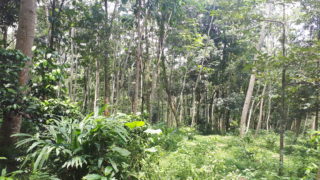
This agroforestry system in Karanganyar, Central Java, Indonesia, has irregular spacing and minimal maintenance. The sengon tree is an important commodity, and the forest contributes to local food security. Photo by Fitta Setiajiati.
The SVLK is mandatory for all but actors in different forest property regimes have experienced different incentives, levels of support or challenges in adapting to the system.
State concession holders generally accept and are satisfied with the SVLK but view government support and economic benefits as moderate to weak. Some companies also obtain voluntary certifications, such as the FSC, to attract international buyers.
Customary forests for indigenous peoples have had limited official recognition and face challenges in obtaining and maintaining SVLK certification. Private forests also face challenges in adapting to the SVLK and obtaining certification.
Although the SVLK has been in development for decades, its impacts are still insufficient to lead to more sustainable livelihoods, especially for Indonesia's most marginalized populations, such as indigenous peoples, local communities, and smallholders.
The report recommends a better fit of the SVLK for customary and private forests. There is a need for increased government support of smallholder farmers, recognition of the land tenure of indigenous peoples and streamlining the issuance of the SVLK self-declaration of conformity for these groups.
In July 2021, the government of the DRC lifted a 19-year moratorium on the allocation of new industrial logging concessions, which emerged after negotiations with the World Bank for a post-war economic recovery deal.
The moratorium had been put in place to end looting and destruction of the country's forests but had been largely ineffective in stopping deforestation and illegal logging.
The lifting of the moratorium was announced despite not fulfilling conditions established in 2015 including converting old logging titles into forest concession contracts, deploying transparency mechanisms and creating a plan for a phased lifting of the moratorium.
The government sees the lifting of the moratorium as an opportunity for land resources to contribute to revenue collection, infrastructure development and also the benefit of the people.
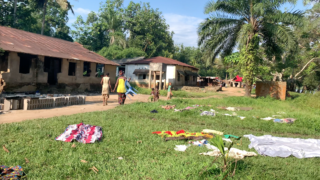
Forest community in the province of Équateur, DRC. Some indigenous peoples and local communities hope for better regulations and an economy that enables education, health, water and transport.
International non-governmental organizations (NGOs) and national civil society groups disagree with the government stating that the decision is contradictory to the DRC's aim to become a ‘climate crisis solution country’ and will harm indigenous peoples, local communities and the environment.
The report suggests that international partnerships and finance have imposed unsuitable frameworks onto the DRC without sufficiently collaborating to understand and address basic needs, local priorities and the concerns of the majority in the Congo basin. These include looking at strengthening rural livelihoods and building infrastructure and institutional capacities.
There are positive impacts of the FSC certification and the Amazon Fund in Brazil on forest governance in the Amazon but these are not sufficient solutions. Multiple sources indicate that these mechanisms have not sufficiently addressed the causes of long-term deforestation or contributed to the well-being of forest peoples.
There is evidence that FSC certification contributes to material well-being and productivity in certified units managed by indigenous peoples in the Amazon but the FSC system has several limitations for smallholders, indigenous peoples, and local communities.
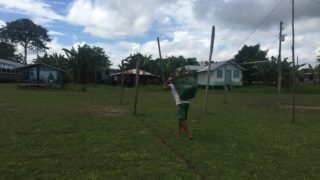
Smallholders in Careiro da Várzea, Amazonas, Brazil. Rural communities receive limited support from the state and international partnerships. Photo by Thiago Kanashiro Uehara
Smallholders have been dependent on external support to obtain and maintain FSC certification but this support is often limited or absent.
The Amazon Fund has enabled grassroots organizations, NGOs and community associations to build and strengthen capacities to establish international partnerships. This REDD+ facility has also contributed to strengthening environmental agencies at the subnational and national levels.
The report recommends that donors, banks and investors support local and regional initiatives that respect, value and promote sustainable livelihoods and local knowledge besides halting investments in activities that negatively impact forest conservation.
The report also recommends international cooperation to update theories of change and monitoring, evaluation and learning (MEL) processes, which should encompass the social and distributive dimensions of forest governance.
The report has found that while there are benefits from North-South forest governance mechanisms there are also challenges. One major issue is the unequal distribution of costs and benefits, with marginalized groups in tropical regions not seeing as much benefit as governments and large corporations, corrupt or not.
Partnerships between policy institutes in the Global North and Global South can foster and embed transnational policy discussions at both the national and international levels. There is a need for government donors and philanthropic organizations to invest in just partnerships across regions and continents, capacity strengthening for policy analysis and in action research methods. This will benefit international cooperation programmes in the medium to long term.
Achieving transformative change necessitates a shift away from market-based or commodity-centred approaches such as those focused on supply chains and offsetting schemes. The report recommends that government donors and philanthropic organizations focus on stronger environmental policies and regulations, coupled with mechanisms that commit to improve the well-being of peoples, particularly of marginalized groups.
Policymakers should create policy mixes that align with both global and domestic priorities and realities and consider cost and benefit distribution in policy making. This involves finding equilibrium between land uses such as forestry, agriculture, mining and infrastructure as well as sectoral policies both domestically and internationally. The distribution of costs and benefits should be factored in the policy-mixes.
The report suggests that government donors and philanthropic organizations should emphasize the implementation of robust environmental policies and regulations as well as the adoption of mechanisms that ensure the protection of human rights, promote well-being and sustain livelihoods. By taking this approach, it is possible to achieve prosperity, conserve the environment and mitigate poverty, inequality and hunger.
There is a need to build suitable equitable forest governance mechanisms, through a ‘glocalized’ approach, for future generations and the environment. Indeed, co-creation and co-leadership are promising approaches for a just transition to a sustainable future.
Transnational forest governance mechanisms should be improved with stronger environmental laws and regulations, and a ‘glocal’ approach to policymaking. To achieve this, international policy instruments should commit to contribute to the well-being and sustainable livelihood of forest, rural peoples and small-scale entrepreneurs as outcomes and be crafted in inclusive fora where considerations of power imbalances are seriously addressed.
Acknowledgements
We thank Paula Bernasconi, Tom Blomley, Paolo Cerutti, Antony Froggatt, Georg Hahn, Alison Hoare, Erin Matson, Thomas Pichet, Henry Throp, and a blind reviewer for comments on the manuscript; we thank Alison also for having co-initiated this project, as well as Charlotte Watts, Kate O’Reilly, Lavina Ranjan and Anum Farhan for project management support. We thank the project advisory board, Isabel Drigo, Jean Mboma, Julia Falconer, Paolo Cerutti, Patrick Kipalu, Pedro Nogueira, Purabi Bose, Rukka Sombolinggi, Soeryo Adiwibowo, Sudarsono Soedomo and Thomas Pichet, especially for their initial inputs to the project, for enriching dialogues and for helping with connections with other key stakeholders. We also thank Jack Barry and Owen Grafham for providing comments on the editorial plan. A special thought goes to Yulius Hero. The conclusions and recommendations of this paper do not reflect any institution’s views or official policies, and any omissions or mistakes remain the authors’ own.
The research and publication of this paper was made possible with the support of the Forest, Markets and Climate Governance (FGMC) programme of the UK Foreign, Commonwealth and Development Office.

